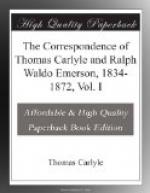And yet before I come to the end of my letter I may repent of my temerity and unsay my charge. For are not all our circlets of will as so many little eddies rounded in by the great Circle of Necessity, and could the Truth-speaker, perhaps now the best Thinker of the Saxon race, have written otherwise? And must not we say that Drunkenness is a virtue rather than that Cato has erred?
I wish I could gratify you with any pleasing news of the regeneration, education, prospects, of man in this continent. But your philanthropy is so patient, so far-sighted, that present evils give you less solicitude. In the last six years government in the United States has been fast becoming a job, like great charities. A most unfit person in the Presidency has been doing the worst things; and the worse he grew, the more popular. Now things seem to mend. Webster, a good man and as strong as if he were a sinner, begins to find himself the centre of a great and enlarging party and his eloquence incarnated and enacted by them; yet men dare not hope that the majority shall be suddenly unseated. I send herewith a volume of Webster’s that you may see his speech on Foot’s Resolutions, a speech which the Americans have never done praising. I have great doubts whether the book reaches you, as I know not my agents. I shall put with it the little book of my Swedenborgian druggist,* of whom I told you. And if, which is hardly to be hoped, any good book should be thrown out of our vortex of trade and politics, I shall not fail to give it the same direction.
-------------- * Observations on the Growth of the Mind, by Sampson Reed, first published in 1825. A fifth edition of this thoughtful little treatise was published in 1865. Mr. Reed was a graduate of Harvard College in 1818; he died in 1880, at the age of eighty. ---------------
I need not tell you, my dear sir, what pleasure a letter from you would give me when you have a few moments to spare to so remote a friend. If any word in my letter should provoke you to a reply, I shall rejoice in my sauciness. I am spending the summer in the country, but my address is Boston, care of Barnard, Adams, & Co. Care of O. Rich, London. Please do make my affectionate respects to Mrs. Carlyle, whose kindness I shall always gratefully remember. I depend upon her intercession to insure your writing to me. May God grant you both his best blessing.
Your friend,
R.
Waldo Emerson
II. Carlyle to Emerson
5 Great Cheyne Row, Chelsea, London 12 August, 1834




